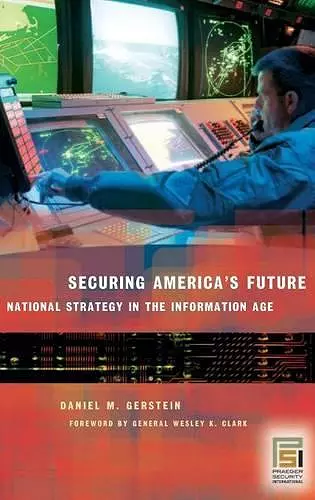Securing America's Future
National Strategy in the Information Age
Format:Hardback
Publisher:Bloomsbury Publishing PLC
Published:30th Sep '05
Currently unavailable, currently targeted to be due back around 30th January 2026, but could change

"This is the best book yet on how new information technology affects the key elements of national security strategy, and how that strategy must be adapted to exploit the Information Age." -- Leslie H. Gelb^LPresident Emeritus, Council on Foreign Relations "Dan Gerstein has written a strategically cogent work--prescient in analysis and insight--definitional for thinking about U.S. national security strategy in this new century--timely as the Bush administration and the Congress must struggle toward resolution of how to meet national security requirements in this new era of the post Cold War world--made all the more challenging by the magic of the microchip. Gerstein's work is truly transformational in analysis and diagnosis of current and future national security needs of American in this new century of globalism in an information age--a fact not recognized by national leadership in this first decade of century 21." -- General Gordon R. Sullivan, (U.S. Army, Ret.), former Chief of Staff of the Army and President of the Association of the U.S. Army "This insightful book outlines challenges to U.S. national strategy as America faces a globalized, information-dense world. Military and civilian scholars alike will benefit from Dan Gerstein's analysis, carefully refined over a distinguished career in arms control, information operations, and military strategy. A must read for the 21st century leader." -- General Barry R. McCaffrey (U.S. Army, Retired)^LDistinguished Professor of International Security Studies^LUnited States Military Academy, West Point
Examines the history of US national security strategy, and he analyses the results and conclusions of several key documents, including the 9/11 Commission Report. This book coordinates all aspects of US national security legislation and looks at both hard power and soft power.As the world moves further into the Information Age and the ensuing increased levels of globalization, the ability to harness all of the elements of national power in an integrated, coordinated, and synchronized manner will be even more critical for the United States to successfully defend itself. Gerstein argues that the United States as a nation is largely unprepared to reap the full benefits of the Information Age and unable to address an increasing threat level because its methods, procedures, and ways of thinking remain anchored to the Industrial Age that is rapidly being left behind. To understand and adapt to this emerging environment, the United States must re-examine the development and the implementation of national security strategy. Gerstein examines the history of U.S. national security strategy, and he analyzes the results and conclusions of several capstone documents, including the National Security Strategy of the United States (2002), the Homeland Security Strategy of the United States (2002), the Commission of National Security/21st Century, and the 9/11 Commission Report. After evaluating the execution of U.S. national security strategy, Gerstein maintains that U.S. efforts today are more heavily weighted to the use of hard power—political, military, and intelligence resources—for achieving strategic goals and objectives. A strategy that incorporates more fully the elements of national power, including soft power such as economic, social, cultural, and informational capabilities will better serve the interests of the nation. In addition, Gerstein proposes a new way of looking at strategy. Typically, strategy has been defined as the linking of ways and means to achieve ends while mitigating risk. In the future, we must factor environment into any discussion.
Securing America's Future describes the complex relationship between government and industry in today's information age….[t]races the defense of the United States through its history, showing the various threats and strategies for victory….[a] serious analysis of world events and approaches to national security. * ARMY *
Gerstein, a Gulf War veteran and a military fellow of the Council on Foreign Relations, argues that in terms of defense, the US is largely unprepared to reap the benefits of the information age and unable to address an increasing threat level because its methods, procedures, and ways of thinking remain anchored in the vanishing industrial era. Based on the conclusions of several capstone documents (including the 9/11 Commission Report), he says the nation must develop and implement a new security strategy that incorporates elements of soft power, such as economic, social, cultural, and informational capabilities. * Reference & Research Book News *
ISBN: 9780275988777
Dimensions: unknown
Weight: 567g
288 pages